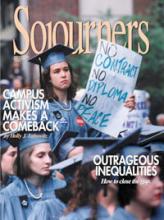Responding to the tragedy at Columbine High School, educator Thomas de Zengotita wrote in a recent issue of Harpers that a "hybrid entity with a structuring life of its own has emerged on the planet." This "entity" is identified as a new public culture that blurs the borders between reality and simulation. Littletons Eric
Harris and Dylan Klebold became caught up in this limbo, as have countless other teen-agers and adultsthough the vast majority with consequences that are less destructive, yet not completely harmless.
This illusory culture, which De Zengotita calls an "entity" but the Apostle Paul might call a "principality and power," is able to consume those who havent established their own sense of who they areespecially, but not exclusively, young people. For young Christians and those who walk along beside them, the call to engage this invasion of illusion is especially critical.
For nearly 2,000 years, the power of God has kept the onslaught of such principalities and powers at bay through baptism, confirmation, holy communion, and the other sacraments of Christianity. Spiritual direction, discipleship, and biblical teaching also have proven themselves to be effective in guiding people into maturity and freedom. Though the gospel has always been about the discerning of truth from deception, the new paradigms and tools at the end of this century create a context that is dramatically different than ever before. Will the church of the new millennium be as successful in creating safe space for young people and at helping them distinguish the simulated warfare on a computer screen from the spiritual warfare of the heart?
Read the Full Article
